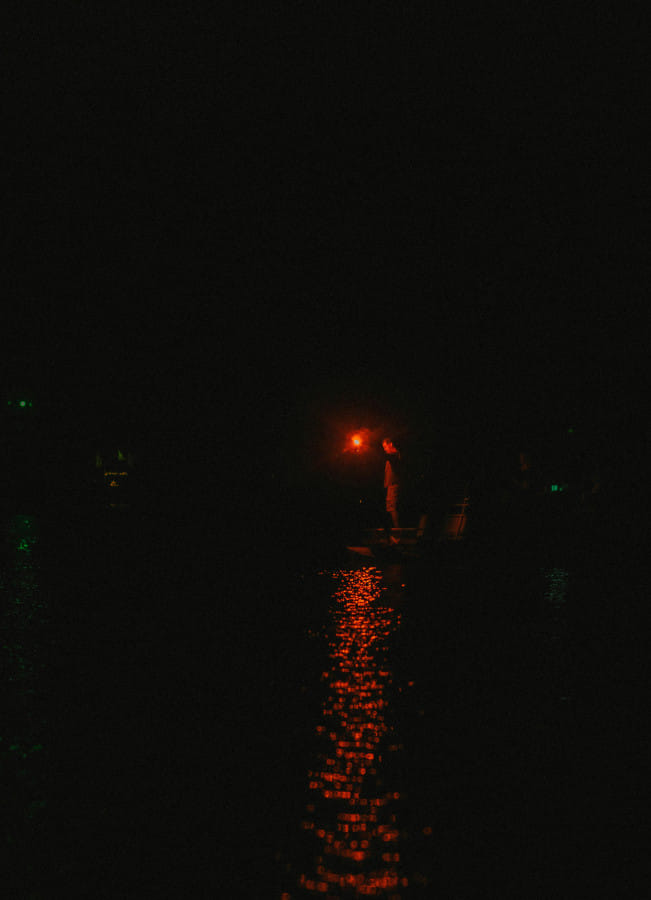The song was taking its toll on me. I would fall asleep any moment now. The boat was rocking with the flow of the current underneath. Was I dreaming? What is the specific boundary between sleep and wakefulness? The gigantic sky above me was glowing red. Innumerable miles below, frogs were croaking; crickets, "cricking"; large, ghost-like banyan trees, hissing. I was trying to gulp the rare beauty of a night I seldom encountered: "Majhe majhe tobo dekha pai, Chirodin keno pai na."
Is it necessary that lullabies – songs sang in order to put babies and young children to sleep – must be those few that are officially treated as lullabies? Ghum Parani Mashi Pishi is of course amazing, and no doubt a "successful" lullaby indeed, but if you think of it, any song that is very soft and soothing and rhythmic can be a lullaby.
I had my share of the traditional lullabies. I loved them. But strangely, my favourite lullaby is a Tagore song. My first encounter with Rabindranath was on a boat during a monsoon many years ago. Being one of the earliest memories, I remember it in bits and pieces, which have been enough to conclude that it was one of the most magical nights of my life.
My head rested on my mother's shoulder. We were in Bikrampur, my village-home; my family was on its way to our ancestral home from a dinner at a relative's house. How do you travel at a village during the rainy season? The most obvious mode of transport is a boat. My mother started to sing Majhe Majhe Tobo Dekha Pai to put me to sleep.

Pitch darkness. The only sources of light were the kerosene lamps on the boats and hand torches to guide the way. But the sky was lit red. Being just a five-year-old child, I was so taken aback, so surprised by this strange phenomenon. Meanwhile, a storm was brewing. But I was nevertheless half-asleep. My eyes were now half-closed. In some strange way, I could still hear my mother's overwhelmingly reassuring and comforting voice:
"Keno megh ashe hridoyo akashe,
Tomare dekhite dae na,
Moho meghete tomare dekhite dey na,
Moho meghete tomare...
Ondho kore rakhe,
Tomare dekhite dey na"
Perhaps due to that night, the meaning of this song to me, quite naively, is totally different and a little bit absurd. It makes me visualise the massive clouds tugged together, the redness of a cloudy sky in a monsoon night and an elusive moon that is hard to find behind the clouds, only allowing a short glimpse every once in a while.
However, when it comes to lullabies, I think the tone does the trick more than the lyrics. In fact, it has been said that it is the love of the parents that makes lullabies so sweet. A scientific study involved recording the voices of several mothers while they were singing lullabies to their baby, and then repeating the process by recording the singing of the same lullabies by the same people in an empty room pretending to have their baby with them. The difference between the two could be easily identified.
Children become programmed to those lullabies regularly sang by their parents' nights after nights. The lullabies work as a stimulus; and whenever that stimulus is given, the children fall asleep as the brain has become "conditioned" to it. So much so, even now if we listen to those songs, it will make us sleepy.
Whatever the rationale, we all have sweet, fond memories regarding lullabies. Since they occurred very early in our life, the pictures in our mind are very hazy.
I strangely believe that no memory is ever lost; every memory is stored; it's somewhere out there inside the brain. And sometimes, all you need is the correct stimulus, and the feeling of a long-lost experience might sometimes just surface, very vividly.
The song playing on the radio was taking its toll on me. I would fall asleep any moment now. The boat was rocking with the flow of the current underneath. But I was lying on my bed. Was I dreaming? What is the specific boundary between sleep and wakefulness? Yes, it had all come back. The gigantic sky above me was glowing red. Innumerable miles below, frogs were croaking; crickets, "cricking; large, ghost-like banyan trees, hissing. I was trying to gulp the rare beauty of a night that I seldom encountered:
"Majhe majhe tobo dekha pai,
Chirodin keno pai na"








Comments